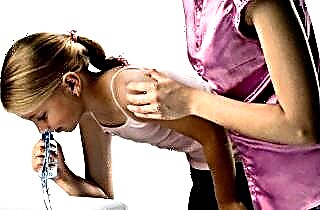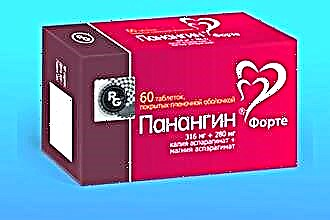A cough that occurs at night is a serious problem not only for the baby himself, but also for his parents. And the fact that he does not allow you to sleep normally is the smallest inconvenience. The fact is that very often a night cough has no accompanying symptoms and it is not easy to find out the cause of its appearance. But the first thing to do if the baby coughed heavily at night is to stop the attack. And only then try to get to the bottom of the reasons.
Causes of a nocturnal cough
 Nocturnal cough is not always infectious. Much more often, on the contrary, he has nothing to do with them. Moreover, the presence of an infection in a child's body is usually easy to determine by the accompanying symptoms: snot appears, the temperature rises, the child becomes lethargic, often naughty.
Nocturnal cough is not always infectious. Much more often, on the contrary, he has nothing to do with them. Moreover, the presence of an infection in a child's body is usually easy to determine by the accompanying symptoms: snot appears, the temperature rises, the child becomes lethargic, often naughty.
Non-infectious causes are much more difficult to identify, but this is also possible if you carefully observe the child:
- An allergic cough at night in a child occurs when the allergen is located close to the bed or directly in bed. This can be: synthetic clothing, chemical dyes, woolen blanket, down or feather pillow, houseplants, dust, pet hair. Therefore, if you notice that the child is coughing some time after falling asleep, and the cough is accompanied by swelling, abundant transparent mucous secretions, redness of the eyes, carefully examine the room and the bed. Perhaps the allergen can be detected, and the problem will be solved without treatment.
- Bronchial asthma. It even occurs in infants and is also often exacerbated at night. The cough in this case is sharp, suffocating, without sputum, often reaching vomiting. The child's face turns red, he begins to choke, panic appears. The cough is not accompanied by fever or other "cold" symptoms. You can quickly relieve an attack only with a special inhaler.
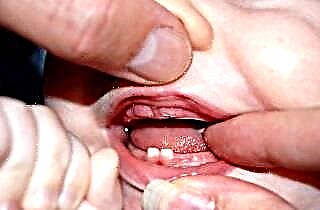 Air is too dry. If the child is constantly in motion during the day, he is distracted by other children, he often eats or drinks and this keeps the mucous membranes moist, then this does not happen at night, and they quickly dry up, causing a reflex barking cough without other symptoms. The cough goes away as soon as the child receives a few sips of warm drink.
Air is too dry. If the child is constantly in motion during the day, he is distracted by other children, he often eats or drinks and this keeps the mucous membranes moist, then this does not happen at night, and they quickly dry up, causing a reflex barking cough without other symptoms. The cough goes away as soon as the child receives a few sips of warm drink.- Teething in young children can also be accompanied by a nocturnal cough. During this period, all children experience increased salivation. During the day, saliva is swallowed or drains freely from the mouth. At night, especially if the pillow is flat and the baby's head is thrown back, it can flow down the throat and cause a reflexive coughing fit. The easiest way to stop coughing in this case is to change your pillow.
- Stomach problems. Increased acidity of gastric juice or reflux disease. When the body is in a horizontal position, part of the stomach contents flows into the esophagus, causing irritation and coughing as a response. You can suspect a problem with sour breath in a child, frequent belching, poor appetite. There are usually no other symptoms and such a cough does not occur during the day.
Of course, these are not all the reasons why a cough occurs at night. And if none of them is suitable in your case, you should not delay your visit to the doctor. And even more so, self-medicate, not understanding what exactly you are trying to cure.
How to relieve an attack
 When a child has a severe cough at night, the first thing to do is to calm the baby down and stop the attack. You will understand its causes and make diagnoses later. First, you need to do everything possible to alleviate the condition as much as possible. There are several effective ways to relieve a coughing attack in a child:
When a child has a severe cough at night, the first thing to do is to calm the baby down and stop the attack. You will understand its causes and make diagnoses later. First, you need to do everything possible to alleviate the condition as much as possible. There are several effective ways to relieve a coughing attack in a child:
- Change in body position. In some cases, this is already enough for the attack to pass. When the head is thrown back, mucus from the nose flows into the larynx and causes irritation. When the head is raised, excess mucus flows out through the nose.
- Warm drink. It helps almost immediately. With a strong cough, the larynx quickly becomes irritated, and the warm liquid moisturizes and soothes it. Warm milk with a small amount of baking soda or a teaspoon of ghee (cocoa butter, goat or badger fat) helps well with a strong cough. It creates a protective film on the throat that prevents the mucous membrane from drying out and relieves irritation.
- Antihistamines are a good way to stop a bad cough at night. But only if he is allergic. They quickly relieve laryngeal edema, reduce the amount of mucus secreted, and some are anti-inflammatory. It is impossible to use it for a long time without a doctor's prescription.
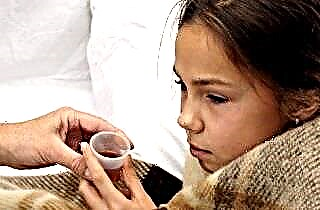 Antitussive agent. Suppresses the cough reflex in various ways. It is better to use it only when it was not possible to stop the night attack by other means. It is not combined with expectorant drugs and has a number of contraindications. But if the barking cough already comes to vomiting, it is better to give the child a medicine, and go to the doctor in the morning.
Antitussive agent. Suppresses the cough reflex in various ways. It is better to use it only when it was not possible to stop the night attack by other means. It is not combined with expectorant drugs and has a number of contraindications. But if the barking cough already comes to vomiting, it is better to give the child a medicine, and go to the doctor in the morning.- Inhalation. Only dry cough can be removed by inhalation. When wet with steam, the mucus on the back of the larynx can swell and obstruct airflow, causing suffocation. But with a dry cough, relief will come after just a few breaths, if its cause is not asthma. Steam inhalation can also aggravate an asthma attack, so use this remedy at night very carefully.
Often, you can quickly stop coughing with the help of available tools: a spoonful of honey, placed under the tongue; egg yolk beaten with sugar; diluted in half with honey or water with aloe juice. When there is a cough medicine on hand, you can also use it without exceeding the dosage prescribed in the instructions.
If you have had a cough at night only once, you may have been able to find out and eliminate the cause. But if such situations are repeated regularly (not even every night, but several times a month, for example), then the problem cannot be ignored. This is a clear signal that something is wrong with the child.
Treatment options
 Of course, to completely get rid of a night cough, you can only eliminate the main cause of its appearance. After all, a cough in itself is not a disease, but only one of the symptoms that shows that not everything is in order with the baby. Therefore, the treatment of a cough of a non-infectious nature is always symptomatic: we remove the irritant - the problem disappears.
Of course, to completely get rid of a night cough, you can only eliminate the main cause of its appearance. After all, a cough in itself is not a disease, but only one of the symptoms that shows that not everything is in order with the baby. Therefore, the treatment of a cough of a non-infectious nature is always symptomatic: we remove the irritant - the problem disappears.
Allergic cough has only one treatment option: eliminating exposure to the allergen and taking antihistamines during an attack. If the allergen is "hiding" and it is not possible to detect it on its own, it is necessary to be tested. Modern medicine has in its arsenal a fairly wide range of tests that can significantly narrow the range of search, and in some cases clearly identify the allergen.
Bronchial asthma is a chronic disease that periodically worsens. During the period of exacerbation, medical treatment is prescribed by a doctor. And during periods of remission, it is enough just to have a portable inhaler with a special drug at hand, which is able to remove even a very severe attack in just a few entries.
 Colds, acute respiratory infections, hypothermia at the initial stage are perfectly treated with folk remedies without the use of antibiotics. A nocturnal cough is usually triggered by the flow of mucus from the nose with the head thrown back.
Colds, acute respiratory infections, hypothermia at the initial stage are perfectly treated with folk remedies without the use of antibiotics. A nocturnal cough is usually triggered by the flow of mucus from the nose with the head thrown back.
Therefore, before putting the child to bed, you must definitely clean and instill his nose, put a pillow higher under his head and make sure that the air in the room is moderately humid (otherwise, crusts form in the nose overnight).
But if attacks of nocturnal coughing occur against the background of an increase in body temperature, a sharp deterioration in general condition, the release of yellow-green snot and the same color of sputum, this is already an indicator of the infectious nature of the disease. And the treatment algorithm in this case should be determined by the doctor.
Treatment of infectious diseases
Infectious diseases that cause coughing always require an integrated approach. The course of therapy is selected so that it simultaneously affects the underlying disease and minimizes the frequency and intensity of attacks. Therefore, in most cases, the doctor prescribes not one, but several drugs from different groups at once:
- Expectorants. Helps to thin the phlegm and make it easier to cough up. Used for wet coughs (bronchitis, pneumonia). Many modern remedies also have anti-inflammatory properties. For children it is better to use syrups "Tussin", "Ambrobene", "Lazolvan", "Gerbion", "Plantain syrup".
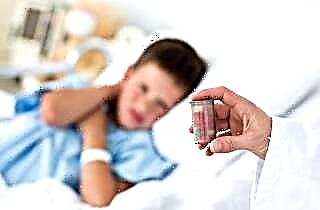 Anti-inflammatory. Quickly relieve inflammation and irritation of the mucous membrane, promote its recovery, soothe a sore throat. Most of them also have antiseptic properties and lower body temperature. Children are most often prescribed in liquid form "Paracetamol", "Aspirin", "Ibuprofen".
Anti-inflammatory. Quickly relieve inflammation and irritation of the mucous membrane, promote its recovery, soothe a sore throat. Most of them also have antiseptic properties and lower body temperature. Children are most often prescribed in liquid form "Paracetamol", "Aspirin", "Ibuprofen".- Antiviral. They help the child's immune system to quickly cope with the causative agents of the disease. They are fatal for most viruses, but at the same time they do not weaken the immune system, like antibiotics, and have practically no side effects. Of the children's antivirals, Interferon, Anaferon, and others are popular.
- Antibiotics It is prescribed for infectious diseases, which could not be cured at the initial stage with home remedies. Treatment with antibiotics for childhood diseases such as measles, whooping cough, and croup is mandatory. We do not provide a list of drugs, as it is selected strictly individually.
Antipyretic drugs do not affect the intensity of cough in any way, therefore they are not included in the complex treatment. They are given only at a body temperature above 38 degrees until it ceases to rise.
 Antipyretic drugs have a bad effect on the work of the heart and digestive organs, so give them to young children as a last resort. Usually, Paracetamol copes with high fever in babies.
Antipyretic drugs have a bad effect on the work of the heart and digestive organs, so give them to young children as a last resort. Usually, Paracetamol copes with high fever in babies.
It is impossible to correct the course of treatment independently prescribed by the doctor! If you disagree with something, the use of some means raises doubts or questions in you - you need to discuss this before starting treatment. You can stop taking one of the medicines only if the child has an allergic reaction to it. You must immediately notify the doctor about this, and he will select another drug with a similar effect.

 Air is too dry. If the child is constantly in motion during the day, he is distracted by other children, he often eats or drinks and this keeps the mucous membranes moist, then this does not happen at night, and they quickly dry up, causing a reflex barking cough without other symptoms. The cough goes away as soon as the child receives a few sips of warm drink.
Air is too dry. If the child is constantly in motion during the day, he is distracted by other children, he often eats or drinks and this keeps the mucous membranes moist, then this does not happen at night, and they quickly dry up, causing a reflex barking cough without other symptoms. The cough goes away as soon as the child receives a few sips of warm drink. Antitussive agent. Suppresses the cough reflex in various ways. It is better to use it only when it was not possible to stop the night attack by other means. It is not combined with expectorant drugs and has a number of contraindications. But if the barking cough already comes to vomiting, it is better to give the child a medicine, and go to the doctor in the morning.
Antitussive agent. Suppresses the cough reflex in various ways. It is better to use it only when it was not possible to stop the night attack by other means. It is not combined with expectorant drugs and has a number of contraindications. But if the barking cough already comes to vomiting, it is better to give the child a medicine, and go to the doctor in the morning. Anti-inflammatory. Quickly relieve inflammation and irritation of the mucous membrane, promote its recovery, soothe a sore throat. Most of them also have antiseptic properties and lower body temperature. Children are most often prescribed in liquid form "Paracetamol", "Aspirin", "Ibuprofen".
Anti-inflammatory. Quickly relieve inflammation and irritation of the mucous membrane, promote its recovery, soothe a sore throat. Most of them also have antiseptic properties and lower body temperature. Children are most often prescribed in liquid form "Paracetamol", "Aspirin", "Ibuprofen".
